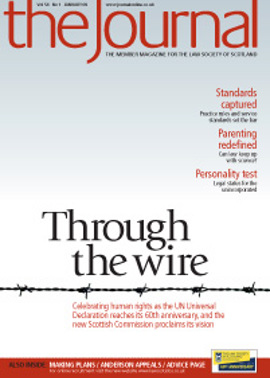Persons unknown

A remarkable feature of modern society has been the proliferation of charities and other not-for-profit organisations: the so-called “third sector”. In Scotland alone, there are estimated to be approximately 45,000 voluntary organisations, around half of which are registered as charities. Most of these organisations take the form of unincorporated associations.
Yet this estimate, made by the Scottish Council for Voluntary Organisations, covers only those associations which have at least a formal set of rules. There are many other, less formal, groupings of individuals working together for a common, non-profit-making purpose. Most readers of this Journal will be members of one or more unincorporated clubs and associations; many will have served as members of a management committee at some time. This is an area of law which affects a substantial proportion of the adult population of Scotland.
It is also an area where the law has fallen out of touch with reality. As everyone knows, unincorporated associations have no legal personality. So far as the law of Scotland – and the law of England & Wales – is concerned, they are legal non-entities. They cannot own property, enter into contracts with suppliers or employees, acquire rights or obligations under the law of delict, or sue or be sued in the Court of Session.
The buck stops where?
But some of these associations undertake activities on a significant scale, despite the absence of any status in law. Employees are engaged, premises are purchased or rented, contracts are concluded. The true legal analysis of these activities may not be given a great deal of thought – until something goes wrong. Consider the following examples:
The organisers of an after-school club enter into a lease of suitable premises. After operating successfully for a year or two, the club finds itself with too few members to be viable and closes down. Who is liable for rent until the end of the lease? Not the club: it does not exist in law. All the committee members? Or just the treasurer who signed the lease on behalf of the club?
A community arts group registered as a charity puts on an exhibition of paintings in a church hall. After setting up the exhibition, someone leaves an extension cable running across the floor just inside the door. A visitor trips over the cable and breaks her wrist. Who does she sue? Not the charity: it is not a legal entity. If an individual who was personally at fault can be identified, he or she may be liable, but who else? The office bearers? All the members of the management committee? All the members of the group?
A national political party which operates as an unincorporated association runs up an overdraft of £20 million at its bank.1 Falling membership contributions result in a shortfall of income which would otherwise have been used to repay the overdraft. If the party were unable to pay its debts, who would be liable? The party treasurer? All the individual members of the national executive committee?
A charity whose activities consist of collecting secondhand household items donated for distribution to families in need of support, engages three van drivers as employees. Due to worries about an impending recession, fewer donations are offered and there is insufficient work for all three drivers. One is made redundant. Who is responsible for the redundancy payment? Not the charity, which is an unincorporated association with no legal personality. Does liability extend to all of the supporters of the charity, or is it restricted to the office bearers?
Messy business
The present law provides no clear and satisfactory answer to these problems. There is, in particular, no reported UK authority on whether the whole membership of an association could be liable in delict for a claim whose value exceeded the association’s funds. In addition, there is the anomaly, highlighted by the case of Harrison v West of Scotland Kart Club 2004 SC 615, that a club member cannot sue the representatives of the club in delict because that would be equivalent to suing himself, among others, as a person who owed the duty of care which is alleged to have been breached.
Practical difficulties may also arise with regard to ownership of the property of an unincorporated association. Title to heritage will usually be taken in name of some or all of the office bearers as trustees for the members of the association. As time passes, these individuals may cease to play an active part in the management of the association, or they may die, and a transfer of title will be required.
In other respects, the association’s absence of legal personality is quietly ignored. For tax purposes associations are treated as if they existed as corporate bodies. In a recent English criminal case, R v RL & JF [2008] EWCA Crim 1970, the Court of Appeal held that a golf club could have been prosecuted for a statutory offence concerning pollution of a watercourse, despite being an unincorporated association. Trade unions have for many years been accorded a kind of “quasi-corporate” status by legislation which permits them to make contracts and to sue and be sued in their own name, as if they were bodies corporate.
Put shortly, the law has got into a mess. Public-spirited individuals who participate in the management of non-profit-making associations may find themselves incurring unexpected personal liabilities. Insurance companies may be deterred from providing cover against public liability because the identity of the insured is unclear as a matter of law. In extreme cases, an unpaid supplier contracting with an association might find himself with no one who is worth suing for payment.
I adopt, therefore I am
Against this background, the Scottish Law Commission has issued a discussion paper inviting comment on proposals for reform of the law of unincorporated associations. Our primary proposal is that there should be new legislation permitting associations to acquire legal personality. We suggest that the attribution of legal personality could either be automatic or at the option of the association.
Under the first of these alternatives, an association would (unless it opted out) be treated as a separate legal entity if it fulfilled a statutory test. We consider various possible tests such as minimum asset value or annual turnover, but the test which we find most attractive is the adoption by an association of a written constitutive document containing certain minimum essential provisions, such as the association’s name, address, objects, criteria for membership, procedure for appointment of office bearers and provision for disposal of assets on winding up.
Use of this test would attribute legal personality to associations, however small, which by adoption of a constitution demonstrated an intention to pursue their activities in a serious and organised manner; but on the other hand would exclude informal arrangements among individuals who would neither wish nor derive any benefit from treatment as a separate entity.
Under the second alternative, an association could, by including an appropriate expression of intention in its constitution, opt into treatment as a separate legal entity. If this alternative were to be preferred, we invite comment on whether any association, however informal, should be able to opt into legal personality, or whether some other minimum criterion should also apply.
The name is Sue
An association with legal personality would be capable of being a party to contracts, including contracts with its members and its staff, and could sue and be sued for breach of contract. Where a representative of the association had properly disclosed his or her agency status prior to entering into a contract, the rights of the other party would be enforceable only against the association and not against the representative or the office bearers as individuals.
Similarly, an association would be vicariously liable for delicts committed by individuals acting on its behalf, and members of the association would cease to be co-principals in relation to the wrongful act. The risk of unlimited liability of members would be removed, and it would become competent for a member of the association to sue it for damages. We hope that this clarification of the law would assist in encouraging insurers to offer cover against risks such as public liability.
Keep it simple
In our preliminary consultations with interested parties we have received a clear message that there is no appetite for any reform which would impose an additional regulatory burden on the not-for-profit sector. A system which attributed legal personality automatically or at the option of the association would not require the creation of a new register of associations. For the sake of completeness, however, we invite comment on whether a new register would be desirable, or, indeed, whether a new form of corporate vehicle is needed for non-profit associations, such as member-interest clubs, which are not charities and which do not qualify for registration as community interest companies.
Initial reaction to our project suggests that there is widespread agreement that it is time for reform of this area of law and that attribution of legal personality is the way forward. Your comments would be most welcome.
In this issue
- Public law in Scotland
- Harmony in conflict management
- Tapping Reeve and his legacy
- Busy times at 60
- Living wills - why?
- Forward by the rights
- A cornerstone of rights
- Welcome for rejections takeup
- Sins of omission
- A time to buy?
- Parenthood reborn
- Persons unknown
- Front of the class
- Setting the standards
- Client service: the standards
- Judicial appointments: how you can take part
- ABS - the next phase
- Third parties and premature complaints
- Planning to perform
- Manual for the mind
- Computing on tap - or money down the drain?
- When resolution is not enough
- Ask Ash
- Making up lost time?
- Don't get caught short by transfer traps
- Collaboration: a new dimension
- Packed and ready
- Regulator on a roll
- Scottish Solicitors' Discipline Tribunal
- Website review
- Book reviews
- Medicines: the wrong cure
- Fraud alert! (and a cautionary tale)






